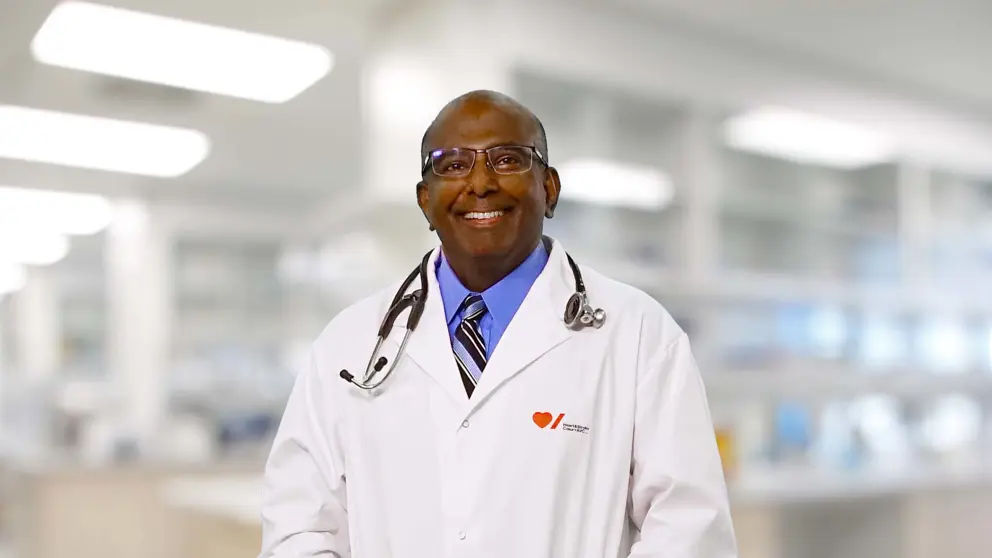The man‘s legs were swollen to the size of tree trunks when he first appeared at the Heart Function Clinic of the Mazankowski Alberta Heart Institute in spring of 2021.
Clinic director Dr. Gavin Oudit knew this fluid buildup signalled advanced heart failure; the man’s heart function was likely reduced to a fraction of what it should be. Tests confirmed the diagnosis.
What shocked Dr. Oudit was that this man was only now seeking medical care for his dire symptoms. The COVID-19 pandemic had kept him away.
“People were trying to cope with their illness as much as possible until they reached a breaking point, because of the fear of coming to hospital,” Dr. Oudit says.
Patients hit hard
Dr. Oudit, a cardiologist and Heart & Stroke funded researcher, believes pandemic-related delays in diagnosis and treatment for people living with heart disease or stroke could severely affect their health.
His concerns are shared by most of the 370 healthcare professionals and researchers across Canada who responded to a Heart & Stroke survey* on the impact of the COVID-19 pandemic.
The survey revealed striking consensus when it comes to the impact on people with heart disease, stroke or vascular cognitive impairment:
- 90% of health professionals and researchers are worried that the health of people living with heart disease, stroke or vascular cognitive impairment has gotten worse because they were not always able to access the care they needed during the pandemic.
- 82% say delays in diagnosis and treatment resulting in worse health are the biggest issue for people living with heart disease or stroke due to pandemic-related disruptions.
- 90% are worried that communities that bore a disproportionate burden of ill effects due to the pandemic will continue to do so.
Toll on research
People were trying to cope with their illness as much as possible until they reached a breaking point.
The pandemic also slowed or stalled progress on critical heart and brain health research, according to 78% of the survey respondents. As public health measures stopped recruitment for some trials, many medical professionals rallied to the front lines of COVID, and had to put their research studies on hold.
For Dr. Oudit, fortunately, that was not the case. In fact, his research lab has been busier than ever because of his pioneering work over many years on ACE2, a protein found on the surface of cells. His past research, supported by Heart & Stroke donors, explored the role of ACE2 in cardiovascular disease, including heart disease and stroke.
Now it turns out that ACE2 acts as a receptor for the coronavirus to enter cells, causing COVID-19.
Dr. Oudit quickly put his team’s expertise to work on the new problem. They showed that elevated levels of ACE2 in blood plasma are a strong indicator of worse outcomes when someone has COVID-19. And they are working on possible therapies to reduce the impact of the virus.
The path forward
While Dr. Oudit is excited about the potential of this research, he is concerned about the long-term impact of the pandemic, especially on the healthy behaviours that reduce the risk of heart disease and stroke.
With many people gaining weight and being less active through lockdowns, he expects to see a spike in cardiovascular risk factors including obesity, high blood pressure and early diabetes. “We need to get revved up again and be connected and start exercising.”
Dr. Oudit says the pandemic has shown the importance of physical activity in particular — and what happens when we don’t get enough.
It’s a view echoed by respondents to our survey: 72% said the pandemic has highlighted the importance of an increased focus on support for health promotion (disease prevention).
Dr. Oudit has some optimism that we’ll adopt this and other lessons from the pandemic — even as the resulting challenges persist for years to come.
“I think things like wearing a mask in the hospital will become pretty standard stuff,” he says. He also sees virtual care becoming a bigger part of the healthcare system, which will help increase access for some patients.
72%
Survey respondents who said the pandemic has highlighted the importance of an increased focus on support for health promotion (disease prevention).
Finally, he says of the pandemic: “Hopefully, if this happens again, we can be much more prepared.”
* The Heart & Stroke survey was conducted Aug. 16 – Sept. 7, 2021, in cooperation with Environics Research. It was completed by heart and brain health researchers, neurologists, cardiologists, family physicians, emergency physicians, nurses, paramedics, rehabilitation and other allied health professionals, pharmacists, and system leaders and decision makers.

